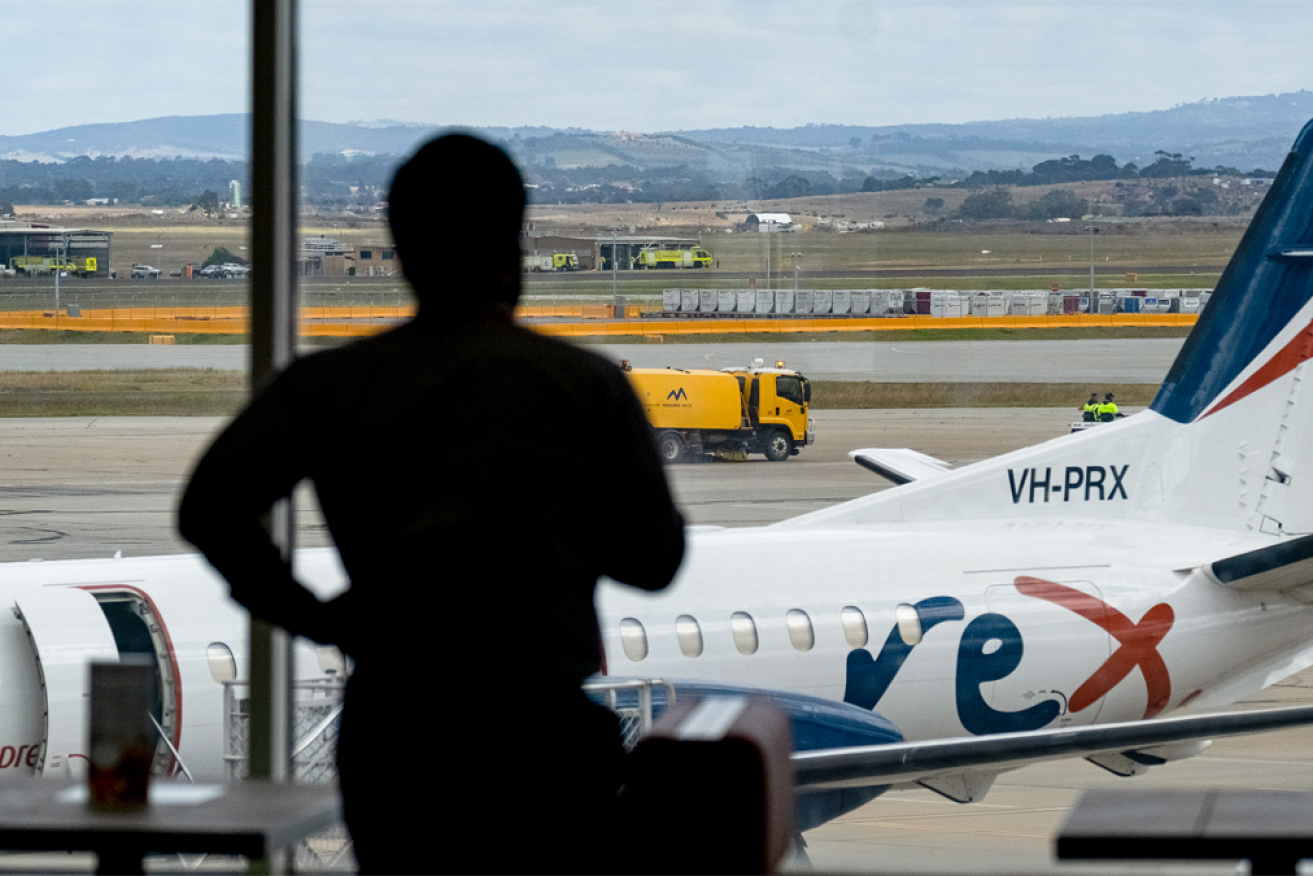Regional airline Rex axes routes as competition for passengers heats up with Qantas


Pilots at regional airline Rex will vote on whether to take industrial action over a pay dispute. Photo: AAP
Independent analysts have backed Qantas in a dispute with regional airline Rex over alleged “illegal predatory behaviour”.
Rex pulled two routes after accusing Qantas of “dumping” tens of thousands of excess seats onto regional routes in an attempt to drive the smaller airline out of the market.
But Qantas has denied the allegations and been supported by independent analysts and by consumer watchdog the ACCC.
Last week, Rex announced it would cease flights between Melbourne and Albury and, on Tuesday, it announced it would also drop its Sydney-Canberra route, which it said had become unviable “after the entrance of an additional operator”.
The new airline on that route was Virgin Australia.
Rex’s deputy chairman and former National Party transport minister John Sharp said Qantas was waging “a war of attrition”.
“Rex has no choice but to look after itself,” he said after Rex pulled out of the Melbourne-Albury route.
But aviation consultant Neil Hansford, chairman of Strategic Aviation Solutions, said Qantas was simply offering a better product with larger economies of scale.

Rex operates smaller and older planes than Qantas on regional routes. Photo: Getty
“Rex has always gone on the mandate of whingeing,” he told The New Daily.
“Whingeing is the first part of their hymn book. It’s always everybody else’s problem.”
Mr Hansford said Qantas entered new regional routes in order to funnel passengers onto its busier jet routes across the country.
“Qantas has, first and foremost, a much more modern, reliable aircraft,” Mr Hansford said.
“Secondly, the Qantas frequent flyer program is a great enhancement. Thirdly, the Qantas regional services connect seamlessly to their international and their interstate services.”
Rex has recently tried to compete on this third point by inking a deal with Delta Air Lines in the US.
Qantas hits back
Qantas has taken a similar line of defence after Mr Sharp accused the company of dumping tens of thousands of excess seats onto regional seats.
A spokesperson pointed out that while Qantas added 31,200 new seats per year on the Melbourne-Albury route, Rex currently has 44,928 seats on the same route, and operated even more than that pre-COVID-19.
“Rex’s standard approach whenever it withdraws from a route is to blame Qantas,” the spokesperson said in a statement to TND.
“Rex’s idea of competition is that it’s something that happens to others, because they believe they have an enshrined right to be the only carrier on some regional routes.”

The three players: Qantas CEO Alan Joyce, Virgin Australia CEO John Borghetti and Rex deputy chairman John Sharp. Photo: AAP
This isn’t the first time a row has emerged between the airlines.
Things kicked off earlier on in the pandemic when Qantas took on new regional routes where Rex had a monopoly, and Rex launched its jet service between the east coast capitals.
In 2021, Qantas even set up a dedicated webpage to refute claims made by Mr Sharp at the time.
Mr Hansford also noted: “If it was, as [Mr Sharp] describes, illegal and predatory, he’d already be in court and have the ACCC all over it.”
The ACCC backed Qantas on this issue last year.
In March 2021, then ACCC chairman Rod Sims told a senate inquiry it was “a bit hard” to call Qantas’ action predatory as he understood the airline was “cash positive on those routes by and large”.
An ageing fleet
Mr Hansford, who has more than 40 years of experience in advising airlines, said Rex has a “geriatric” fleet of planes that can’t compete with Qantas.
For its new routes between capital cities, Rex leases six Boeing 737 jets.
But the backbone of its regional network is a fleet of 67 Saab 340s.
The small turboprop planes seat between 33 and 36 passengers, and went out of production in 1999.
On the other hand, Qantas operates a Dash-8 on the Melbourne-Albury route that can seat up to 74 passengers.
“Now by putting a bigger aircraft on, you’ve still got the same number of pilots, you’re still using the same fuel, but you’re carrying potentially another 30 passengers,” Mr Hansford said.
He believes Rex will be uncompetitive if it does not upgrade its fleet with larger, more modern planes.
The regional airline did not respond to an inquiry about its future fleet plans.








